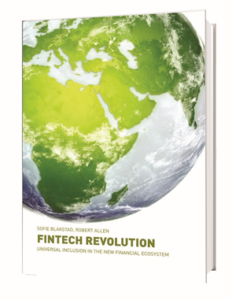
Fintech Revolution Book Chapter Abstract of the Eco vs Egosystem
by Company Announcement July 23, 2018Financial services are changing – changes are being driven by evolving customer behaviour, by the emergence of new types of financial services, and increasingly by novel technology and business models driving the fintech revolution.
These changes are happening against a backdrop of fundamental changes across all sectors as the way we work, communicate and live rapidly evolves, which means businesses, and especially banks, need to adapt to new ways of operating and new service paradigms.
Money and the nature of value are transforming, as different currency systems emerge, which don’t fit existing classifications, while central banks and commercial banks are starting to adopt new technology around their existing services, with differing degrees of success.
Sofie Blakstad and Rob Allen are embedded in driving this change, having moved from building international banks to building the financial trust platform hiveonline, and Allen’s blockchain platform nodl.
 In the book, they describe how the evolving financial landscape can help the most disadvantaged people in the world – the 1.7 billion unbanked, in both developing and developed economies, and how new business models based on decentralised technologies like blockchain, can release capital into sustainable development, reduce corruption and build community wealth.
In the book, they describe how the evolving financial landscape can help the most disadvantaged people in the world – the 1.7 billion unbanked, in both developing and developed economies, and how new business models based on decentralised technologies like blockchain, can release capital into sustainable development, reduce corruption and build community wealth.
New currencies provide an opportunity both for central banks to manage money supply more effectively and for societies to capture and transact with natural wealth such as solar energy, produce or even cows.
Societal changes have led to the evolution of customer behaviour, meaning banks, like other businesses, must adapt to embrace the ecosystem, and think differently about products and services.
Boundaries around businesses are crumbling and the public’s perception of how services are delivered has moved from bricks through clicks to apps, which means rethinking not just how products are delivered, but how services are designed and consumed.
Blakstad and Allen examine some practical approaches to restructuring businesses in a more agile, customer focused way, that allows for the rapid evolutions that will be needed not just in the future, but now.
Ecosystem vs Egosystem and Revolution vs Evolution
This chapter considers the forces driving us from traditional financial services to the emerging financial ecosystem. The authors examine the way financial services organisations have been structured to date, and the binding forces that are keeping them that way, despite efforts to change.
Culture is at the root of this resistance, and by examining the mechanisms reinforcing that culture they start to expose opportunities to reverse that resistance. Blakstad and Allen discuss the factors that have allowed the ecosystem economy to emerge, and how the transition is happening – with some examples of organisations that are successfully bridging the gap.
The change is radical, fundamental, holistic and impacts all aspects of technical financial services; the authors further consider the level of disruption that will be required, be necessary, or result from the transition, and ask whether relatively pain-free evolution will be overcome by a more compromising, dramatic and painful revolution.
They highlight some major innovations in finance in the last ten years, none of which have been driven by banks, and peek over the horizon of the emerging models which are starting to revolutionize financial services.
You can order the book here
Featured image via Pixabay





